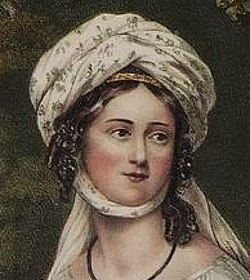Hehe wie hieß die Arvanitin die auf Seiten der Griechen kämpfte?
Da hat es doch so ein Portrait von der...
ach die habe ich vergessen danke das du mich dran errinert hast
Laskarina Bouboulina
From Wikipedia, the free encyclopedia
Jump to:
navigation,
search
Laskarina Bouboulina 3 April 1770 - 15 February 1843

1827 engraving of Bouboulina by Friedel. Nickname Kapetanissa Place of birth
Hydra,
Ottoman Empire
Place of death
Spetses,
Ottoman Empire Allegiance

Greece Service/branch
Hellenic Navy Laskarina Bouboulina (
Greek: Λασκαρίνα Μπουμπουλίνα, 11 May 1771 - 22 May 1825) was a
Greek[1][2][3][4] naval commander, heroine of the
Greek War of Independence in 1821, and posthumously, an
Admiral of the
Imperial Russian Navy.
Contents
[
hide]
[edit] Early life
Bouboulina was born in a prison in
Constantinople, she originated from the
Arvanite community of
Hydra island.
[5][6][7][8] She was the daughter of Stavrianos Pinotsis, a captain from Hydra island and his wife Skevo. The
Ottomans had imprisoned Pinotsis because he had taken part in the failed
Orlof Revolution of 1769–1770 against the Ottoman rule. Her father died soon afterwards and the mother and the child returned to Hydra. Four years later, when her mother married Dimitrios Lazarou-Orlof, they moved to the island of
Spetses. Bouboulina had eight half-siblings.
She married twice, first to Dimitrios Yiannouzas and later to Dimitrios Bouboulis, a wealthy shipowner and captain, taking his surname. Bouboulis was killed in a battle against
Algerian pirates in 1811. Bouboulina took over his fortune and trading business and had four more ships built, including the large warship
Agamemmnon, at her own expense.
In 1816, the Ottomans tried to confiscate Bouboulina's property because her second husband had fought for the
Russians against the
Turks in the
Turko-Russian wars. Bouboulina sailed to Constantinople to meet Russian ambassador
Count Pavel Strogonov to seek his protection. In recognition of Bouboulis's service to the Russians, Strogonov sent her to safety in
Crimea. Bouboulina also met with the mother of
Mahmud II, after which Mahmuud's mother reportedly convinced her son to leave Bouboulina's property alone. After three months of exile in the Crimea, Bouboulina returned to Spetses.
[edit] Support of the independence movement


Flag used by Bouboulina during the Greek revolution.
Bouboulina joined the
Filiki Etaireia, an underground organization that was preparing Greece for revolution against the Ottoman rule, as one of the few female members. She bought arms and ammunitions at her own expense and brought them secretly to
Spetses in her ships, to fight "for the sake of my nation." Construction of the ship
Agamemnon was finished in 1820. It was later one of the largest warships in the hands of Greek rebels. Bouboulina bribed Turkish officials to ignore the ship's size. She also organized her own armed troops, composed of men from Spetses. She used most of her fortune to provide food and ammunition for the sailors and soldiers under her command.
On 13 March 1821 Bouboulina raised her own
Greek flag, based on the flag of the
Comnenus dynasty of
Byzantine emperors, on the mast of
Agamemnon. On 3 April the people of
Spetses revolted and later joined forces with a number of other ships from other
Greek islands. Bouboulina sailed with eight ships to
Nafplion and began a
naval blockade. She led her own troops until the fall of the fort on 13 November 1822. Later she took part in the naval blockade and capture of
Monemvasia and
Pylos. Bouboulina's son, Yiannis Yiannouzas, died in the battle at
Argos, against superior numbers of Ottoman troops.
She arrived in time to witness the fall of
Tripolis on 11 September 1821 and met general
Theodoros Kolokotronis. Later their children Eleni Bouboulina and
Panos Kolokotronis were married. During the ensuing defeat of the Ottoman garrison, Bouboulina saved most of the female members of the sultan's household.
[edit] After independence
After independence, when the opposing factions erupted into a
civil war in 1824, the Greek government arrested Bouboulina because of her family connection to now-imprisoned Kolokotronis; the government also killed her son-in-law. She was eventually exiled back to Spetses. She had used all of her fortune for the war of independence.
[edit] Death in feud
Laskarina Bouboulina was killed in 1825 as the result of a family feud in Spetses. The daughter of a Koutsis family had eloped with Bouboulina's son, Georgios Yiannouzas. The father of the girl, Christodoulos Koutsis, and armed members of his family went to Bouboulina's house seeking her. Infuriated, Bouboulina showed up in the balcony of her house to confront them. After her argument with Christodoulos Koutsis, someone shot at her, the bullet striking her in the forehead. She died instantly. The killer was not identified.
[edit] Legacy
Bouboulina was posthumously awarded the rank of
Admiral by the Russian Navy, a singularly rare achievement for a 19th century woman. Her descendants donated the ship
Agamemnon to the Greek state. It was renamed
Spetsai and became the Navy
flagship. It was burned along with the frigate
Hellas and the corvette
Hydra in the naval base of
Poros by
Andreas Miaoulis during the next Greek civil war in 1831. On the island of
Spetses there is the "Bouboulina Museum", housed in the 300 year-old mansion of Bouboulina's second husband, where her descendants still live. A statue of Bouboulina stands in the harbor in Spetses. Various streets all over Greece and
Cyprus are named in her honor, notably Bouboulina Street near the
National Technical University of Athens (the
Polytechnion) and the
National Archaeological Museum of Athens, in central
Athens, and also in
Piraeus and in
Nicosia.


Statue of Bouboulina in
Spetses.
Bouboulina was depicted on the
reverse of the Greek 1
drachma coin of







